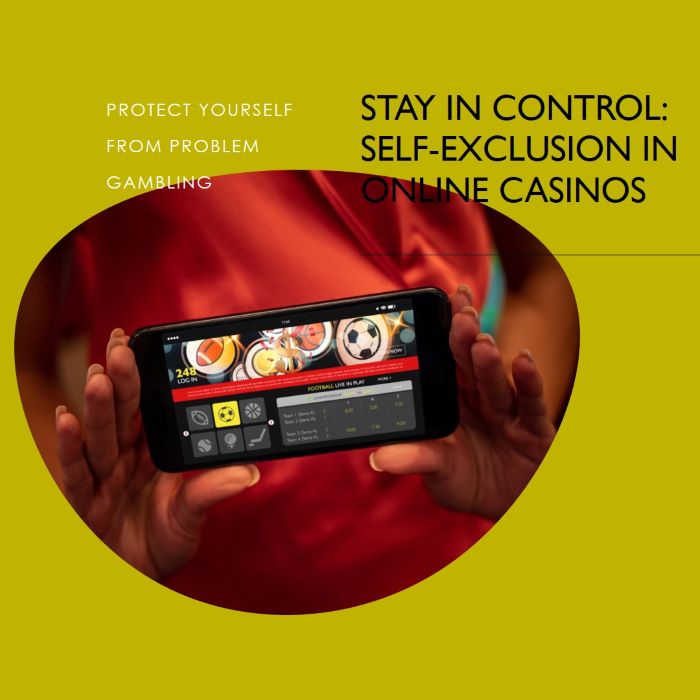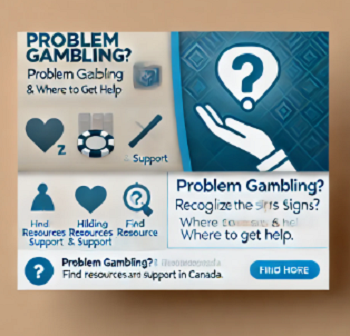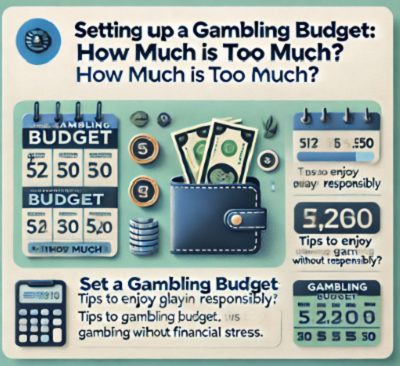Player Self-Exclusion in Online Casinos: A Comprehensive Guide

🎯 I. Introduction
In the ever-evolving landscape of the gambling industry, responsible gambling has emerged as a critical concern. As online casinos continue to flourish, addressing issues related to gambling addiction and problem gambling becomes imperative. One of the essential tools in this effort is player self-exclusion.
🔍 A. Definition of Player Self-Exclusion
Player self-exclusion, a cornerstone of responsible gambling, is a voluntary mechanism through which individuals can restrict their access to online casinos. This initiative allows players to take a proactive stance in managing their gambling habits and potential addiction. During the self-exclusion period, the casino in question will block the individual’s access to its services, aiming to prevent compulsive gambling behaviors.
🌟 B. The Importance of Responsible Gambling
Responsible gambling is more than just a catchphrase; it’s a commitment to ensuring that the enjoyment of gaming does not lead to personal harm or adverse consequences. It acknowledges that gambling should be a form of entertainment, not a source of financial ruin or emotional distress. Player self-exclusion is a crucial component of responsible gambling, as it empowers individuals to regain control over their actions in a responsible and supportive manner.
🌐 C. The Prevalence of Online Casinos and Gambling Addiction
The rise of online casinos has transformed the gambling landscape. With easy access to a wide array of games and betting options, the online platform has made gambling more convenient than ever before. However, this convenience comes with risks, as the accessibility and anonymity of online gambling can contribute to addictive behavior.
As a result, the prevalence of gambling addiction has grown alongside the expansion of online casinos. For many individuals, gambling addiction can lead to financial distress, strained relationships, and deteriorating mental health. Recognizing these risks, both the gambling industry and regulatory bodies have taken significant steps to promote responsible gambling, with player self-exclusion being a critical facet of these efforts.
📌 To continue exploring player self-exclusion in online casinos, this comprehensive guide will delve deeper into its mechanics, benefits, and the steps involved in the self-exclusion process. It will also explore the role of responsible gambling resources, casino operators’ responsibilities, and the potential future developments in player self-exclusion programs. By the end of this guide, readers will have a comprehensive understanding of this vital tool in promoting responsible gambling and preventing gambling addiction. 🌟
🧐 II. Understanding Player Self-Exclusion
Player self-exclusion is a fundamental tool in promoting responsible gambling and mitigating the potential harms associated with compulsive gambling behavior. This section delves into the intricacies of what player self-exclusion entails, how it functions within the realm of online casinos, the legal and regulatory aspects governing it, and the motivations behind a player’s decision to self-exclude.
🌟 A. What is Player Self-Exclusion?
Player self-exclusion, in essence, is a voluntary commitment made by an individual to restrict their access to online casino services for a predetermined duration. This decision reflects a personal acknowledgment of problematic gambling behavior and a proactive step toward responsible gambling.
Key points to understand about player self-exclusion:
- It is initiated by the player themselves.
- It is a formal agreement with the casino to block access.
- The duration can vary, typically from a few months to several years.
- During this period, the player is barred from participating in casino games.
🔧 B. How Does Player Self-Exclusion Work in Online Casinos?
Player self-exclusion in the context of online casinos operates as a safeguard against impulsive gambling decisions. The process generally involves the following steps:
- Registration: The player registers for self-exclusion, providing personal details and specifying the duration of the exclusion.
- Verification: The casino verifies the player’s identity to ensure compliance with the request.
- Exclusion Period: The agreed-upon exclusion period begins, during which the player cannot access the casino’s services.
- Access Restrictions: Online casinos implement technical measures to prevent the self-excluded player from logging in or participating in games.
- Support: Throughout the self-exclusion period, players are encouraged to seek support and counseling for gambling-related issues.
📜 C. Legal and Regulatory Aspects of Self-Exclusion
Player self-exclusion is not merely a feature offered by online casinos; it is often mandated and regulated by authorities. Key points regarding the legal and regulatory aspects include:
- Government Oversight: Many jurisdictions require casinos to provide self-exclusion programs as a condition of their licenses.
- Data Protection: Strict data protection measures are enforced to safeguard the personal information of self-excluded individuals.
- Penalties: Failure of casinos to comply with self-exclusion regulations can result in fines and license revocation.
🤔 D. Why Do Players Choose to Self-Exclude?
Understanding the motivations behind self-exclusion is crucial in comprehending its significance. Players decide to self-exclude for various reasons, including:
- Self-Awareness: Recognizing their own gambling problems and seeking a solution.
- Financial Concerns: To curb financial losses and regain control over their finances.
- Preserving Relationships: To mend strained relationships affected by their gambling habits.
- Emotional Well-being: In a bid to protect their mental and emotional health from the negative impacts of gambling addiction.
📌 In essence, player self-exclusion is a voluntary and regulated approach that empowers individuals to take control of their gambling behavior. The next sections of this guide will explore the benefits of self-exclusion, how to initiate the process, and the effectiveness of these programs in promoting responsible gambling. 🌟
🌟 III. Benefits of Player Self-Exclusion
Player self-exclusion serves as a linchpin in the broader strategy of responsible gambling, offering a range of compelling benefits that extend beyond individual players. In this section, we delve into the key advantages associated with player self-exclusion, highlighting its role in protecting vulnerable players, promoting responsible gambling, preventing financial and emotional harm, and reducing the social cost of gambling addiction.
💪 A. Protecting Vulnerable Players
One of the foremost benefits of player self-exclusion is its ability to safeguard vulnerable individuals from the perils of compulsive gambling. This includes but is not limited to:
- Minimizing Exposure: Self-exclusion reduces the temptation and accessibility of gambling for those who are struggling with addiction.
- Interruption of Patterns: It disrupts established patterns of problematic gambling behavior, offering a chance for reflection and rehabilitation.
- Supportive Environment: It creates a supportive atmosphere for individuals to confront their addiction and seek assistance.
🌐 B. Promoting Responsible Gambling
At its core, player self-exclusion is a powerful tool for promoting responsible gambling practices among players and within the gambling industry. Key facets of this promotion include:
- Empowerment: It empowers individuals to take control of their gambling habits and make informed choices.
- Encouraging Self-Regulation: By voluntarily opting for self-exclusion, players actively engage in self-regulation, which is pivotal to responsible gambling.
- Enhancing Industry Standards: Online casinos that embrace self-exclusion contribute to raising industry standards and their commitment to player welfare.
🚫 C. Preventing Financial and Emotional Harm
Excessive gambling can lead to severe financial and emotional consequences for affected individuals and their loved ones. Player self-exclusion plays a critical role in mitigating these harms:
- Financial Stability: It assists in preventing the depletion of personal finances through compulsive gambling activities.
- Emotional Well-being: By curbing addictive behavior, self-exclusion supports the emotional well-being of individuals, reducing stress and anxiety.
- Preserving Relationships: Preventing gambling-related financial crises helps in preserving family and social relationships.
🌍 D. Reducing the Social Cost of Gambling Addiction
Gambling addiction can exact a substantial social cost on society as a whole. Player self-exclusion contributes to the reduction of this cost in several ways:
- Lower Crime Rates: Reduced gambling addiction leads to lower rates of associated criminal activities, such as theft or fraud.
- Relief on Healthcare Systems: Fewer cases of gambling-related mental health issues alleviate the burden on healthcare systems.
- Enhanced Social Cohesion: Stronger and healthier communities result from fewer individuals grappling with gambling addiction.
📌 In conclusion, player self-exclusion is not only a personal choice but a measure that carries far-reaching benefits. By protecting vulnerable players, promoting responsible gambling, preventing financial and emotional harm, and reducing the social cost of gambling addiction, self-exclusion proves its efficacy in creating a safer and more responsible gambling environment. 🌟
📈 V. The Effectiveness of Player Self-Exclusion
Understanding the effectiveness of player self-exclusion is crucial in assessing its role in responsible gambling. In this section, we explore both the positive aspects, including success stories and testimonials, as well as the challenges and limitations it may face. Additionally, we delve into research findings that shed light on the real impact of self-exclusion programs.
🌟 A. Success Stories and Testimonials
Player self-exclusion has, on many occasions, proven to be a pivotal tool in the journey towards responsible gambling. Success stories and testimonials from individuals who have undergone self-exclusion highlight its effectiveness:
- Regained Control: Many self-excluded players report that the process helped them regain control over their gambling habits.
- Reduced Financial Losses: Testimonials often mention a decrease in financial losses and debts.
- Improved Mental Health: Some individuals attest to experiencing improved mental well-being after self-excluding, as the emotional burden of addiction lessened.
🚧 B. Challenges and Limitations
While player self-exclusion offers significant benefits, it is not without its challenges and limitations:
- Relapse Risk: Some individuals may relapse into gambling behavior once the self-exclusion period ends, especially if underlying issues are not addressed.
- Alternate Platforms: The availability of numerous online casinos may lead self-excluded individuals to seek gambling opportunities elsewhere.
- Limited Control: Self-exclusion does not address the root causes of gambling addiction and relies on the individual’s willpower.
🔍 C. Research Findings on the Impact of Self-Exclusion Programs
Research studies have sought to evaluate the effectiveness of self-exclusion programs, providing valuable insights:
- Positive Outcomes: Research often shows that self-exclusion leads to a reduction in gambling-related problems and expenditure.
- Limited Data: However, there is limited long-term data on the sustained impact of self-exclusion beyond the exclusion period.
- Complementary Strategies: Studies suggest that self-exclusion is most effective when combined with other responsible gambling strategies, such as counseling and support.
📌 In evaluating the effectiveness of player self-exclusion, it becomes evident that while it has brought about positive changes in many individuals’ lives, it is not a standalone solution. Rather, it should be viewed as a vital component of a broader responsible gambling framework, encompassing education, support, and ongoing monitoring. 🌟
🌐 VI. Responsible Gambling Resources
In the quest for responsible gambling practices, player self-exclusion is a valuable tool, but it’s not the sole solution. This section delves into additional resources and strategies that complement self-exclusion and aid individuals in maintaining a healthy and balanced approach to gambling.
💼 A. Other Tools and Strategies for Responsible Gambling
While self-exclusion is a prominent strategy, responsible gambling encompasses a broader spectrum of tools and practices:
- Deposit Limits: Many online casinos allow players to set daily, weekly, or monthly deposit limits, helping them stay within their budget.
- Time Limits: Time management tools enable players to monitor and limit the duration of their gambling sessions.
- Reality Checks: Regular prompts that remind players of their activity duration and expenditure can help prevent excessive gambling.
- Game Restrictions: Some individuals may choose to restrict access to specific types of games to avoid temptations.
- Financial Planning: Establishing a gambling budget and adhering to it is a fundamental responsible gambling practice.
🤝 B. Helplines, Support Groups, and Counseling Services
Seeking help and support is a crucial aspect of responsible gambling. A variety of resources are available to individuals grappling with gambling-related issues:
- Helplines: Gambling helplines provide confidential assistance and guidance to those in need.
- Support Groups: Peer support groups offer a sense of community for individuals facing similar challenges.
- Professional Counseling: Licensed counselors with expertise in gambling addiction can provide personalized treatment plans.
- Family Counseling: Involving family members in the recovery process can foster understanding and support.
📲 C. Online Resources and Apps for Managing Gambling Habits
In the digital age, online resources and mobile applications have emerged as valuable tools for responsible gambling:
- Information Websites: Websites dedicated to responsible gambling provide education, tips, and resources.
- Self-Assessment Tools: Online self-assessment quizzes help individuals gauge the severity of their gambling habits.
- Gambling Blocking Apps: Some apps allow users to block access to gambling websites on their devices.
- Budgeting Apps: Personal finance apps can help users track their gambling expenses and manage their finances effectively.
🌟 These resources, when used in conjunction with player self-exclusion, create a comprehensive approach to responsible gambling. They empower individuals with the knowledge and tools necessary to maintain control over their gambling activities and foster a healthier relationship with gaming. 🌟
🎰 VII. Casino Operator Responsibilities
In the realm of responsible gambling, casino operators play a pivotal role in safeguarding the well-being of their patrons. This section outlines the responsibilities of online casinos, shedding light on their legal obligations, the promotion of responsible gambling on their platforms, collaboration with self-excluded players, and potential penalties for non-compliance.
⚖️ A. Legal Obligations of Online Casinos
Online casinos operate within a regulatory framework that imposes specific legal obligations:
- Licensing Requirements: Many jurisdictions mandate that online casinos obtain licenses contingent on providing responsible gambling measures.
- Self-Exclusion Programs: Casinos are often legally required to offer self-exclusion programs as part of their responsible gambling initiatives.
- Data Protection: Strict data protection laws ensure that the personal information of self-excluded players is secure and not misused.
📢 B. Promoting Responsible Gambling on Casino Websites
Responsible gambling promotion on casino websites is more than a mere formality; it’s a moral and legal duty:
- Information Provision: Casinos should prominently display information about responsible gambling, including links to self-exclusion programs and support resources.
- Reality Checks: Implementing reality checks to remind players of their activity duration and expenditure is a common practice.
- Links to Helplines: Direct access to gambling helplines and support services should be readily available to players.
🤝 C. Collaborating with Self-Excluded Players
Casino operators have a responsibility to collaborate with self-excluded players in a supportive and constructive manner:
- Blocking Access: Online casinos must ensure that self-excluded players cannot access their services during the exclusion period.
- Communication: Establishing clear channels of communication for self-excluded individuals seeking information or assistance is essential.
- Assisting Recovery: Casinos may provide information on counseling and support resources to self-excluded players looking to address their gambling addiction.
⚠️ D. Penalties for Non-Compliance
Failure to comply with responsible gambling regulations can result in penalties for online casinos:
- Fines: Regulatory authorities may impose fines on casinos that do not meet their responsible gambling obligations.
- License Revocation: In extreme cases of non-compliance, a casino’s license may be revoked, effectively shutting down its operations.
- Reputation Damage: Non-compliance can damage a casino’s reputation, leading to loss of trust among players and stakeholders.
🌟 In summary, online casinos bear a significant responsibility in promoting and ensuring responsible gambling practices. Compliance with legal obligations, active promotion of responsible gambling on their websites, collaborative efforts with self-excluded players, and vigilance to avoid penalties are all vital components of a casino operator’s role in creating a safer gambling environment. 🌟
🚀 VIII. The Future of Player Self-Exclusion
The landscape of responsible gambling is continually evolving, and player self-exclusion is no exception. This section delves into the exciting prospects and developments on the horizon, including technological advancements, international cooperation, and potential improvements and challenges that lie ahead.
🌐 A. Technological Advancements in Responsible Gambling
The future of player self-exclusion is intertwined with technological advancements that promise to enhance its effectiveness:
- Biometric Verification: Enhanced security measures, such as biometric verification, may be integrated to ensure the accuracy of self-exclusion registrations.
- Artificial Intelligence (AI): AI-powered algorithms could be employed to identify patterns of problematic behavior and provide timely interventions.
- Blockchain Technology: Utilizing blockchain for self-exclusion records may offer unparalleled transparency and security.
🤝 B. International Cooperation and Standardization
In an increasingly interconnected world, international cooperation and standardization are key to the evolution of player self-exclusion:
- Global Standards: Efforts to establish global standards for self-exclusion programs can streamline processes and ensure consistency.
- Cross-Border Collaboration: Collaboration between different jurisdictions and online casinos can enhance the effectiveness of self-exclusion initiatives.
- Data Sharing: Secure sharing of self-exclusion data across borders may prevent individuals from seeking gambling opportunities in other regions.
🌟 C. Potential Improvements and Challenges Ahead
As player self-exclusion evolves, it faces both opportunities and challenges:
Potential Improvements:
- Personalization: Tailoring self-exclusion programs to individual needs and preferences.
- Early Intervention: Identifying at-risk players before addiction escalates.
- Integration: Seamless integration of self-exclusion tools across various online gambling platforms.
Challenges:
- Evasion Techniques: Addressing potential evasion techniques that individuals may employ to circumvent self-exclusion measures.
- Privacy Concerns: Ensuring robust data protection while facilitating cross-border data sharing.
- Stigma Reduction: Overcoming the stigma associated with self-exclusion to encourage more individuals to seek help.
📌 In conclusion, the future of player self-exclusion holds great promise in fostering responsible gambling practices. Technological advancements, international cooperation, and a commitment to addressing both improvements and challenges are essential components in the evolution of this vital tool. As the gambling industry continues to evolve, so too must the mechanisms in place to protect individuals from the potential harms of addiction. 🌟
🌟 IX. Conclusion
As this comprehensive guide on player self-exclusion in online casinos draws to a close, it’s essential to recap the vital importance of this responsible gambling tool, encourage individuals to seek help when needed, and offer final thoughts on the pivotal role of self-exclusion in fostering responsible gambling practices.
🔍 A. Recap of the Importance of Player Self-Exclusion
Throughout the guide, we have underscored the critical significance of player self-exclusion as a cornerstone of responsible gambling. To recap, player self-exclusion:
- Empowers individuals to take control of their gambling habits proactively.
- Protects vulnerable players from the perils of compulsive gambling.
- Promotes responsible gambling practices within the online casino industry.
- Prevents financial and emotional harm associated with gambling addiction.
- Contributes to reducing the social cost of gambling addiction on society.
Player self-exclusion is not merely a concept; it is a practical tool that plays a crucial role in preventing the negative consequences of gambling addiction and fostering a safer gambling environment.
🤝 B. Encouragement for Individuals to Seek Help When Needed
Individuals who find themselves struggling with gambling-related issues should take to heart the following message:
- Seeking help is a sign of strength, not weakness. It reflects the courage to confront challenges.
- A plethora of resources, including helplines, support groups, counseling services, and online tools, are available to provide guidance and support.
- Friends and family can be powerful allies in the journey towards responsible gambling. Don’t hesitate to confide in them.
The path to responsible gambling is paved with support and understanding. It is a journey that can lead to a healthier and more fulfilling relationship with gaming.
🌐 C. Final Thoughts on the Role of Self-Exclusion in Responsible Gambling
In the ever-evolving world of online gambling, player self-exclusion stands as a beacon of hope. It signifies the collective commitment to responsible gambling and the welfare of players. In these final thoughts:
- Embrace self-exclusion as a proactive measure, not a last resort.
- Recognize that it is one part of a broader responsible gambling framework, complemented by tools, support, and education.
- Be mindful of the evolving landscape of responsible gambling, which promises technological advancements, international collaboration, and continuous improvement.
In conclusion, player self-exclusion is not a solitary solution but a vital component of responsible gambling. Its efficacy lies in its ability to empower individuals, protect the vulnerable, and contribute to a safer and more responsible gambling environment for all. 🌟




